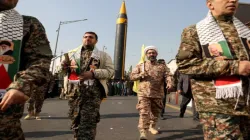Iran's 'Axis of Resistance': A growing threat to Middle East stability
Iran's Axis of Resistance is a coalition with the potential to further destabilize the Middle East amid the ongoing Israel-Gaza conflict. Their coordinated actions against Israel and close ties to Iran could trigger wider conflicts, disrupt global trade, and worsen humanitarian crises.

Iran has long supported a coalition of groups known as the "Axis of Resistance," united against Israel and U.S. influence in the Middle East. This alliance includes Hamas, Hezbollah in Lebanon, the Houthi movement in Yemen, various Shi'ite armed groups in Iraq, and the Syrian government. These groups are deeply linked to Iran and are actively involved in the ongoing Israel-Gaza conflict, which could further destabilize the Middle East.
The Axis of Resistance: An Overview
- Lebanon's Hezbollah
Hezbollah, or the "Party of God," was established by Iran's Revolutionary Guards in 1982 to combat Israeli forces in Lebanon. This powerful group, which also plays a significant political role in Lebanon, shares Iran's Shi'ite Islamist ideology. Hezbollah has been attacking Israeli targets at the Lebanese-Israeli border almost daily since early October, leading to heavy exchanges of fire. These actions have caused significant displacement on both sides of the border.
- Yemen's Houthis
The Houthi movement took control of large parts of Yemen in 2014, overthrowing the Saudi-backed government. Aligned with Iran, the Houthis have recently entered the Israel-Gaza conflict by launching drones and missiles towards Israel. Their actions have disrupted international shipping routes, prompting retaliatory strikes from the United States and Britain.
- Islamic Resistance in Iraq
Shi'ite groups in Iraq, closely linked to Iran, have targeted U.S. forces in response to Israeli actions in Gaza. These groups, while officially under Iraqi government control, often operate independently and possess significant military power. They have been involved in various conflicts, including fighting against the Islamic State.
- Syria
The Syrian government, led by President Bashar al-Assad, is a key member of the Axis of Resistance. Syrian territory has seen attacks by Iran-backed militias on U.S. forces and Israeli airstrikes against Iranian and Hezbollah positions. This has turned Syria into a complex battleground, contributing to regional instability.
Potential for Further Crisis
The Axis of Resistance's strong ties to Iran and their actions against Israel pose a significant threat to Middle East stability. Here are some ways this coalition could worsen the crisis:
- Escalation of Violence: Continuous attacks on Israel by Hezbollah and other groups could lead to a wider conflict, drawing in more countries and causing significant destruction and displacement.
- Disruption of Trade: The Houthi attacks on shipping routes in the Red Sea have already affected global trade. Continued disruptions could lead to economic instability worldwide.
- International Tensions: Retaliatory strikes by the U.S. and Britain against Houthi targets increase the risk of a broader international conflict, straining global diplomatic relations.
- Rise of Extremism: The actions of the Axis of Resistance could inspire other extremist groups, leading to increased violence and terrorism in the region.
Humanitarian Impact:
Ongoing conflicts have already displaced millions and caused widespread suffering. Further aggression by the Axis of Resistance could exacerbate these humanitarian crises, leading to more poverty and instability.
(With inputs from Agencies)
READ MORE | Iran's Supreme Leader orders direct attack on Israel after Ismail Haniyeh's assassination: Report
READ MORE | 'Israel will exact heavy price for revenge attacks': Netanyahu after Hamas leader killing | VIDEO